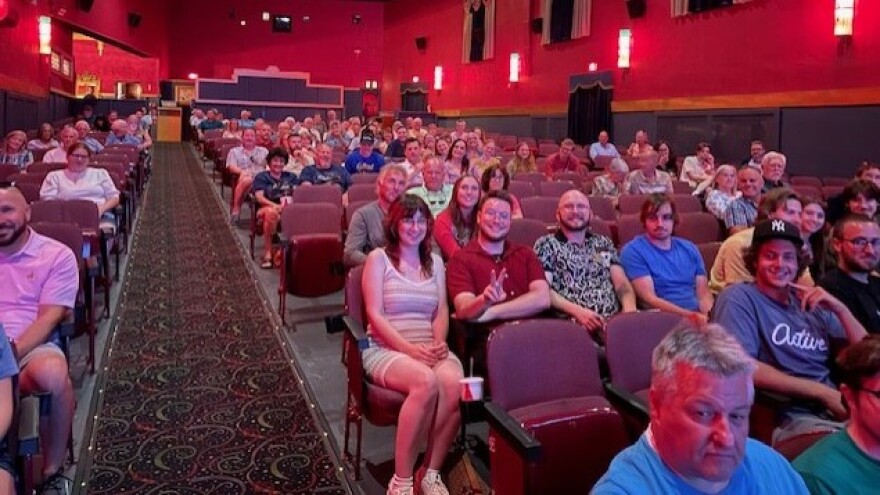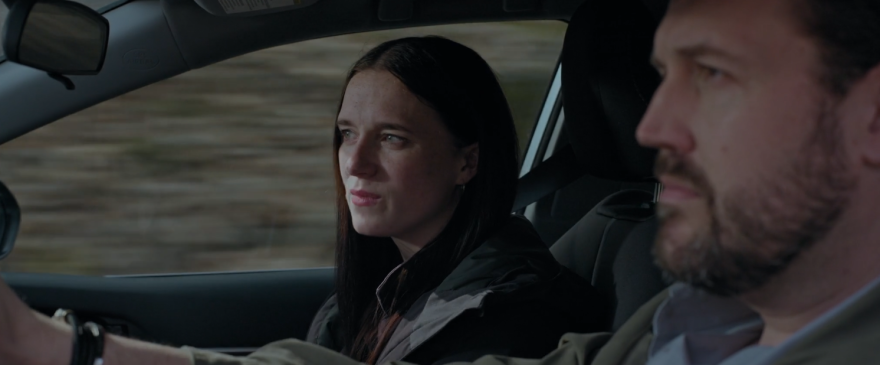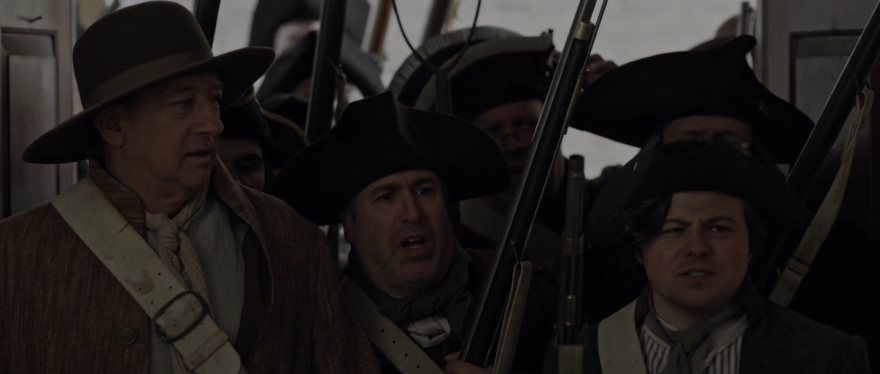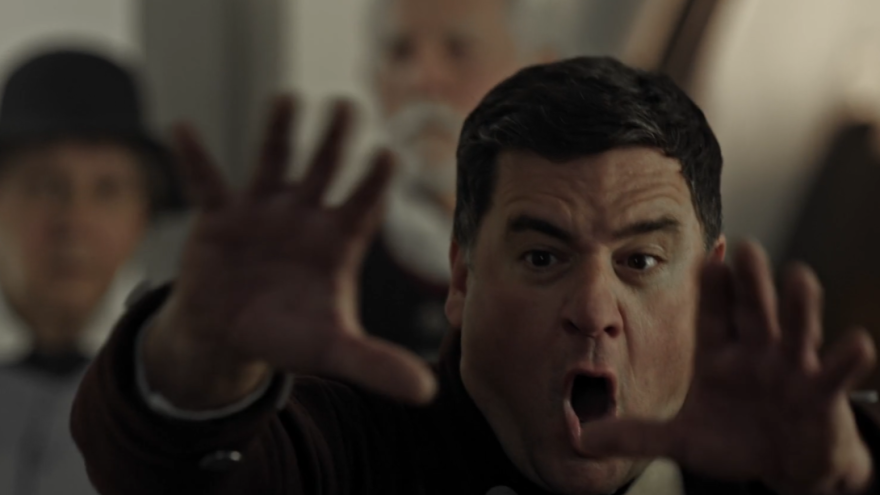LOWER MACUNGIE TWP., Pa. — Lower Macungie Historical Society wants you to hop on a historical road trip across the region.
The new docudrama "The Fries Rebellion" is a unique project. Spearheaded by Lower Macungie Historical Society and its president Sarajane Williams, who wrote the script, the 30-minute film spotlights local history without being either a documentary or historical fiction.
Rather, it follows Kayla (portrayed by Nancy Kimball), a student who reluctantly moved to the Lehigh Valley from Ohio. She is a bit of a stick in the mud about her recent move to the region and even more about having to do a report on local history for school immediately.
"I don't know if any other films feature the Valley in a historical way like this, with such depth about our local history and featuring a Pennsylvania German culture."Lower Macungie Historical Society President Sarajane Williams
She partners with her uncle Steve (Jon Reinhold), a local professor, to go to local historical sites such as Quakertown's Red Lion Inn and Bethlehem's Sun Inn to learn about where and how the Fries Rebellion of 1798-99 took place.
"The Fries Rebellion" is set to premiere at a gala at 4 p.m. Aug. 25 at Wind Creek Bethlehem Casino.
Tickets to the gala, at $149, are available for purchase until Aug. 10. Admission includes music, drinks, seated dinner, and the film screening.
Historical society representatives say the gala is to raise money for distribution to non-profits and schools to act as an educational tool for K-12 teachers in eastern Pennsylvania and help fill gaps in local history in school curriculum.
'A very crucial time'
The revolt, which took place during President John Adams's administration, also is known as the House Tax Rebellion.
It was led by auctioneer John Fries, who was tried for treason and sentenced to be hanged near the Red Lion Inn with two others before Adams granted amnesty to the rioters.

It was not alone for its time, with other tax-related revolts the Shays' Rebellion and Whiskey Rebellion (also in Pennsylvania) happening in the short time after independence was won.
"It was really a very crucial time in the development of the country," Williams, the historical society president, said.
"The Constitution was only 10 years old and this was the first tax that Congress had approved."
Locally, John Fries and the Fries Rebellion still have a mark on the area, notably in the naming of the John Fries Highway.

This year marks the 225th anniversary of the rebellion's conclusion.
The film was pursued as a part of nationwide celebration of the United States' 250th anniversary in 2026.
Lower Macungie Township Historical Society worked to get the 30-minute, professionally produced and edited film made with production companies In the Wee Hours and ubiFire Video Productions of Allentown.
The film kicked off a fundraising tour last summer after the successful filming of a teaser scene.
Funds were raised from local government grants, individual contributors, local businesses and nonprofits throughout the Lehigh Valley.
A vision into the past
While touring through the sites of the tax revolt, the film uses the Pennsylvania Dutch folk concept of powwow as a mechanism through which Kayla starts to see visions of the chaos, violence and struggle that occurred in the past as she touches and interacts with where it took place.
She sees the Federalist government's tax assessors being threatened and driven out, and federal soldiers bringing a harsh backlash onto the rebellion — which included patriotic Revolutionary War veterans.
The viewer joins Kayla as she is told by Steve what moments in her different visions were, and the context that led to them.
The film does not cast the rebels as heroes or villains, but rather as something to reflect on.
The flashback scenes and discussion of the history serve to remind viewers that the early days of the United States were not a clean and polished victory for republican rule, as common narratives might lead us to believe.
The film, through Steve, argues that fear and bias from the Pennsylvania Dutch being an ethnic minority, misinformation, and notions of freedom and liberty that arose over the unease and currents of the revolutionary period drove them to push back against the government authority.
A strong ensemble cast sells it well with shouts in angry German, wearing clothing of the time, and using authentic tools.

One tongue-in-cheek moment meditated on how the anger and misinformation many see as a sign of the times today also was a pressing issue back then.
"So they had fake news even back then?" Kayla asks at one point.
Those involved in the film, which wrapped filming in March, said they hope viewers can connect these issues to the current day, as well as other points of modern reflection like backlash over the use of taxes to fund war efforts.
The film even comments on the changing times of the township, reflecting on a historical farmstead owned by one of the rebels now being developed.
And if you get lost in the history or locations — don't worry. The production team is developing an educational guide to accompany the film.
A unique experience
There is a wonderful novelty to there being such a hyperlocal concept done by a professional crew.
Acting, editing and color-grading all undeniably felt like a "real" film, something smaller-scale projects can often struggle to do.
Drone shots highlighted the more rural parts of the Lower Macungie area, and the attitudes and locations chosen emphasized that it really was a different place nearly 250 years ago.
"Macungie, or Millerstown as it was known back then, looked a lot different in 1799," Steve says in the film.
"It was an unkempt village made up of mostly bog and frame houses, a muddy main road, and intersecting cow paths."
It won't give you the same level of information and clarity about the historical event as reading a textbook or attending a college lecture would.
But as a tool to introduce history in a new way, it could connect with new people and give the region's amateur historians a new way to appreciate it.
It's one thing to get a lecture, it's another to hear and see people represent what happened and how people felt.
"I don't know if any other films feature the Valley in a historical way like this, with such depth about our local history and featuring a Pennsylvania German culture," Williams said.
"So I think it's going to be quite a legacy film for us, and we should all be celebrating it, not just because it's our project.
"When you learn about your history, and you have some roots and you appreciate where you live, you take care of it, so that's the next step in what we need to preserve our community."


